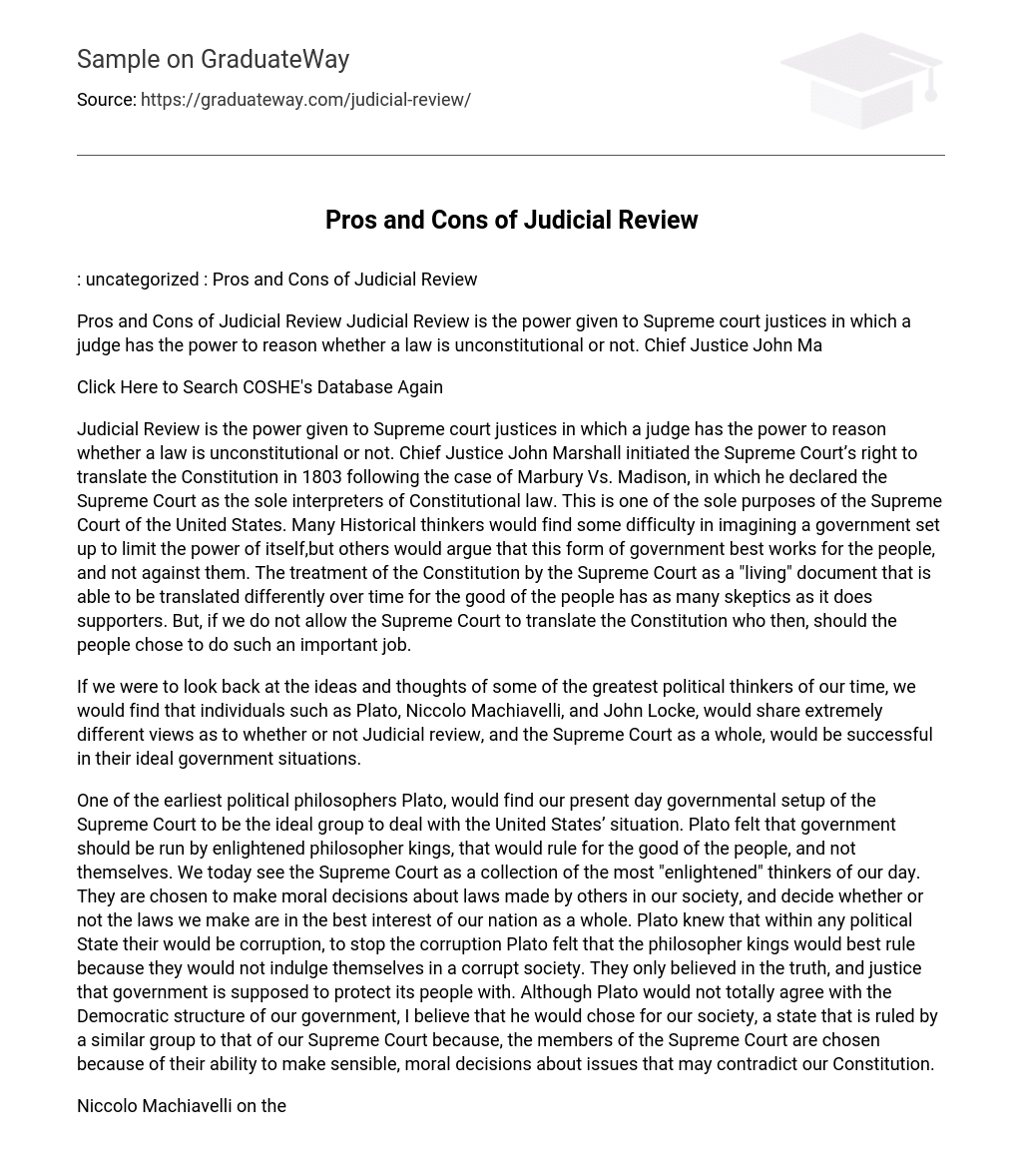Judicial Review is a power bestowed upon Supreme Court justices, wherein they assess whether a law adheres to the Constitution. Chief Justice John Marshall, in the 1803 Marbury Vs. Madison case, established this authority which solidified the Supreme Court as the ultimate interpreter of Constitutional law. Presently, this stands as one of the main responsibilities of the United States Supreme Court.
While some historical thinkers may have difficulty imagining a government that limits its own power, others argue that this type of governance ultimately benefits the people rather than working against their interests. The Supreme Court’s approach of viewing the Constitution as a flexible document capable of various interpretations in order to serve the public good is both praised and criticized. Nevertheless, if we deny the Supreme Court the power to interpret the Constitution, then who should be entrusted by the people with this vital responsibility?
Examining the ideas and perspectives of notable political thinkers like Plato, Niccolo Machiavelli, and John Locke reveals contrasting opinions on the success of judicial review and the Supreme Court within their ideal governmental contexts.
Plato, an early political philosopher, would view the present-day Supreme Court of the United States as an exemplary establishment for tackling national matters. According to Plato’s philosophy, governance should be entrusted to wise philosopher kings who prioritize the well-being of citizens above their own interests. In our society today, the Supreme Court is regarded as a collection of intellectually enlightened individuals. Their responsibility involves evaluating ethical judgments on laws formulated by others within our community and determining if these laws are beneficial for the entire country.
According to Plato, corruption is inevitable in any political state. He proposed the concept of philosopher kings as a remedy – individuals who would refrain from engaging in a corrupt society. These rulers were dedicated solely to upholding truth and justice, the fundamental principles by which government should govern its citizens. While Plato may not fully endorse our democratic system, I believe he would support a society governed by a similar group like our Supreme Court. The justices of the Supreme Court are chosen based on their ability to make logical and ethical decisions on matters that might conflict with our Constitution.
According to Niccolo Machiavelli, if anyone other than the President of the United States were tasked with translating Constitutional law, it would lead to numerous problems. Additionally, he strongly opposes the idea of people making laws based on their personal moral beliefs.
According to Machiavelli, virtue and idealism are major adversaries of the State. In his view, a government should prioritize obedience by disregarding individual virtues when making political decisions. Machiavelli would consider the idea of a group elected to safeguard citizens’ virtue and uphold morally correct laws as absurd and chaotic, since it is impossible to create a completely virtuous government.
Machiavelli believed that the best type of government is one that operates on the principles of realism rather than idealism. In reality, it is not feasible for a government to thrive under a notion that grants authority to powerless individuals to determine the moral correctness of laws within a Constitution that leans towards idealism rather than realism.
John Locke, a more contemporary philosopher, would consider the Supreme Court’s power of Judicial Review to be a crucial aspect of the United States’ democratic framework. Locke would appreciate the effectiveness of the government’s division of powers, which limits each branch’s authority. He would perceive our system of “Checks and Balances” as an excellent method of ensuring that the government serves the people. Locke advocated for every individual’s right to “self Preservation,” asserting that we all possess an equal right to uphold natural law.
Locke emphasizes the importance of equal treatment for all individuals, as it violates their right to “self Preservation”. In a similar vein, the Supreme Court has the responsibility to assess whether a law could threaten our right to “self preservation”. Locke asserts that for a government to effectively protect its citizens’ rights, it must prioritize safeguarding each individual’s “Life and Liberty”.
Locke regards the United States Constitution as an exemplary document that embodies his ideals. The Supreme Court plays a vital role in safeguarding both the people and the Constitution, which is essential for a government centered on individual rights rather than collective interests.
Various philosophers held differing beliefs about the optimal form of government. Some advocated for a system where the people govern, while others favored rule by a single dictator or king. However, the United States’ democratic system, which places importance on protecting individual rights, has undeniably achieved success. Our ancestors recognized the importance of safeguarding each person’s rights as expressed in the phrase “All men are created equal.” These principles have greatly influenced one of today’s most prosperous political states.





